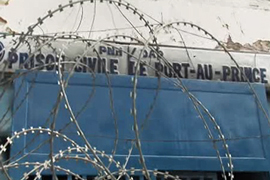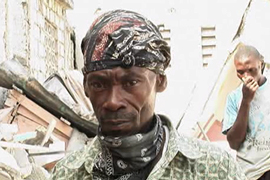
Haiti: Hope among the rubble
Does Haiti’s own response to the earthquake contain the seeds of a brighter future?
In the weeks since Haiti was struck by a massive earthquake on January 12, scenes from the aftermath of the catastrophe have been playing out on television screens around the world.
Not surprisingly much attention was initially focused on the effectiveness of the aid response, the dramatic rescue of survivors and the tragedy of a mounting death toll which may eventually exceed 200,000.
But, inevitably, many have also begun asking whether the country can ever recover from such a blow.
Although, with UN help, Haiti’s political and economic circumstances had been improving recently, it was still the poorest country in the Western hemisphere – scarred by its tortured past and years of global indifference.
| special report | |
|
This most recent disaster may have momentarily caught the attention of politicians, journalists and NGOs but there is more than a whiff of guilt attached to some of the help from richer nations, which could – and arguably should – have previously done much more to lift Haiti out of poverty and despair.
And when the television lights go off and the hospital ships sail away, many of those same underlying problems will still be there and Haiti will be on its own once more.
So what then for Haiti’s shattered government and traumatised people? What part will either be able to play in its reconstruction?
In the days following the disaster, People & Power’s Juliana Ruhfus and Caroline Pare set out to try and answer these questions, focusing their attention on Haiti’s own response to the calamity to see whether it contained any seeds of a brighter future.
Nowhere to go
 |
| About 70 per cent of the buildings in Port-au-Prince have been destroyed |
The country clearly faces immense challenges. Seventy per cent of all buildings in the capital Port-au-Prince alone are destroyed, two million people have been left homeless, 15 out of 17 government ministries have been wiped off the map.
Getting food, water and medical care to those most in need is an immediate priority, but the list of pressing tasks beyond that is daunting.
Schools and hospitals have been destroyed, roads have been split open, sanitation has failed. Most people are living in makeshift shelters with few possessions other than the clothes they are standing up in. There is nowhere to go, nothing to do.
Who can have a job when there are no places left in which to work? And if there is no work, there is no money. Charities and aid agencies can and will help but they will not reach everyone or be able to provide more than the barest essentials.
Haitian resilience
But Haitians are nothing if not resilient – and they have become extraordinarily adaptable and resourceful over the years.
Within hours of the disaster, for example, employees of the CNE, Port-au-Prince’s municipal authorities, were sent out onto the streets to collect bodies and spray disinfectant to help prevent the spread of disease.
Four days later they were still at it and one of them was eager to explain why: “It is not the foreigners who should do this work for us. It is us who need to put our heads together and start, and then the international community can help us finish the job.”
What is left of the administration, meanwhile, has made its headquarters in the run down surroundings of a district police barracks – one of the few government properties left standing.
Barely guarded, the compound outside is swarming with visitors, a few of them journalists hungry for information, most of the others Haitian ministers and civil servants, clustered under trees for urgent meetings with local and foreign NGOs or merely huddled in exhausted groups exchanging news about loved ones.
Functioning government?
 |
| Haiti’s president insists that everything is under control and aid distribution is efficient |
But though many are still in shock, it is evident that work of a sort is underway here, as Bien Aime, the interior minister, fiercely bats away any suggestion that the state government is not functioning.
Rene Preval, Haiti’s president, was directly in charge, he insisted, and though communications were difficult, the situation was in hand.
“We’ve put a lot of effort into coordinating effort at town hall level, they are the best ones to evaluate need and distribute aid. Now the entire structure of government is working.”
That is not what some others believe. Later in the day an angry throng gathers outside a Port-au-Prince storage depot.
A government truck has arrived to pick up food aid for the nearby town of Carrefour, but the officials with it have to turn away empty-handed when the crowd accuse them of wanting the food for themselves.
‘Security is impossible’
 |
| The capital’s prison is destroyed, leaving people concerned about former inmates on the streets |
Elsewhere in the city, a businessman supervises the boarding up of what is left of his shop.
“Security is impossible,” he says. “The prison is destroyed; all the thieves are on the streets. It is truly no good right now.”
Are things as bad as he fears? Mario Andresol, the police chief, seems to think so. His men were not trained for such a situation, he says.
“We were in control before the earthquake. Now we have 4,000 bad guys in the streets who we have to arrest. It is very difficult.”
But down at the city’s now ruined prison, one of the former inmates can be found picking quietly through the rubble in search of his few belongings.
He claims many of the so-called “bad guys” had been just like him, incarcerated for minor misdemeanours and were no threat to anyone.
“Most of them will have got as far away as possible, scared for themselves,” he says.
Indeed, in spite of some of the colourful rumours about looting and armed gangs that begin circulating around the international media, combing through Port-au-Prince in search of a story, there does seem to be little actual trouble on the streets; a few isolated cases here of hungry people ransacking shops and homes for food, a few heated arguments there over salvaged bags of rice, but not much else.
The presence of 7,000 UN troops and police forces seems to be making a difference -even though there is no sign yet of the 10,000 US troops reported to be landing at the city’s airport.
Entrepreneurial spirit
 |
| People have started to clear up the capital’s streets and make plans for the future |
And so as the days go by some of the more entrepreneurial Haitians start to make sense of their surroundings, spotting opportunities to help their country back on its feet and perhaps do a little business on the side.
Fritz Mevs is one of the most prominent. He belongs to one of the six Haitian families that dominate the country’s economy and he has arranged to lend his private pier to the US navy so that aid can be landed from the sea.
Although it is not clear if any money is yet changing hands, he obviously believes that people like him will play an important role in the weeks and months to come.
“Politicians don’t have to deliver in countries like mine. Even the NGOs don’t have to make a profit. But private sector entrepreneurs have to survive by making a profit,” he says.
‘Chance to reconstruct’
Meanwhile in another makeshift and open air government compound, Jude Celestine, the director of the CNE public works department, is holding the latest in a series of emergency meetings.
According to his staff he has been calm and far-sighted since the night of the disaster, doing his best with limited resources to start clearing up the streets of Port-au-Prince and planning for the future.
Over blue prints of the city that was, he is already dreaming of the city that might be.
“It is a chance to reconstruct. The city was never built properly and we have an opportunity to build it in the way a city should be built,” he says.
But for now, those plans will have to wait. Alex Larsen, Haiti’s health minister who thought “the end of the world” had come when the earthquake hit, has just turned up to beg Celestine the use of scarce CNE bulldozers to clear land for a 1,500 bed hospital.
The deal quickly secured, Larsen leaves, beaming his pleasure, “You see. We’re working. Can you see the state exists?”
There will be many more such meetings in the weeks and months ahead, and not all of them with such a positive outcome.
No amount of bonhomie, optimism and resourcefulness will get Haitians over all the obstacles they now face, let alone heal the dreadful physical and mental scars with which so many have been left.
But there are hopeful signs to be found among the rubble of this battered country, hope that things can improve and that one day peace and security and even some degree of prosperity might return to a people who have suffered so much.
